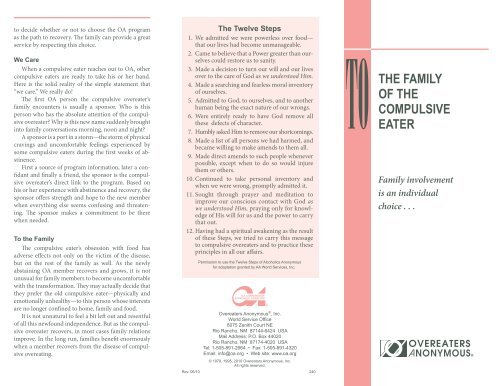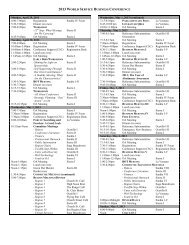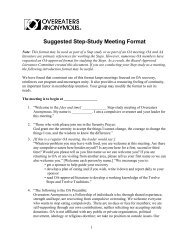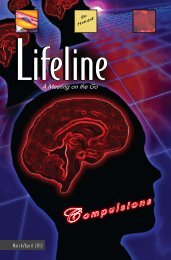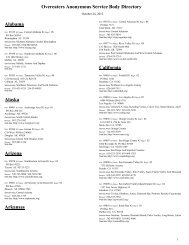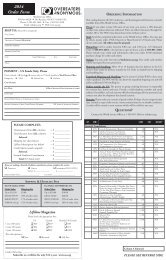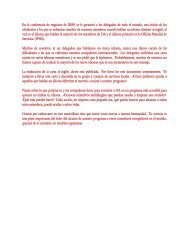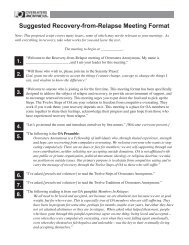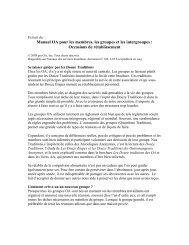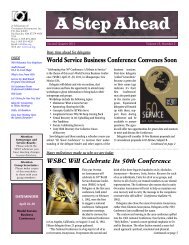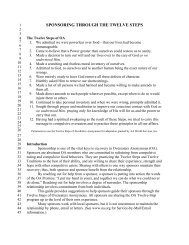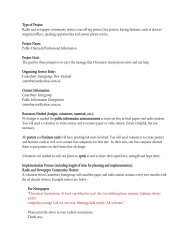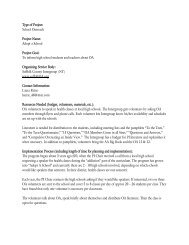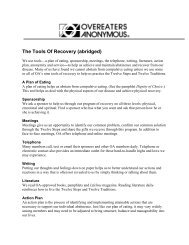THE FAMILY OF THE COMPULSIVE EATER - Overeaters Anonymous
THE FAMILY OF THE COMPULSIVE EATER - Overeaters Anonymous
THE FAMILY OF THE COMPULSIVE EATER - Overeaters Anonymous
You also want an ePaper? Increase the reach of your titles
YUMPU automatically turns print PDFs into web optimized ePapers that Google loves.
to decide whether or not to choose the OA program<br />
as the path to recovery. The family can provide a great<br />
service by respecting this choice.<br />
We Care<br />
When a compulsive eater reaches out to OA, other<br />
compulsive eaters are ready to take his or her hand.<br />
Here is the solid reality of the simple statement that<br />
“we care.” We really do!<br />
The first OA person the compulsive overeater’s<br />
family encounters is usually a sponsor. Who is this<br />
person who has the absolute attention of the compulsive<br />
overeater? Why is this new name suddenly brought<br />
into family conversations morning, noon and night?<br />
A sponsor is a port in a storm—the storm of physical<br />
cravings and uncomfortable feelings experienced by<br />
some compulsive eaters during the first weeks of abstinence.<br />
First a source of program information, later a confidant<br />
and finally a friend, the sponsor is the compulsive<br />
overeater’s direct link to the program. Based on<br />
his or her experience with abstinence and recovery, the<br />
sponsor offers strength and hope to the new member<br />
when everything else seems confusing and threatening.<br />
The sponsor makes a commitment to be there<br />
when needed.<br />
To the Family<br />
The compulsive eater’s obsession with food has<br />
adverse effects not only on the victim of the disease,<br />
but on the rest of the family as well. As the newly<br />
abstaining OA member recovers and grows, it is not<br />
unusual for family members to become uncomfortable<br />
with the transformation. They may actually decide that<br />
they prefer the old compulsive eater—physically and<br />
emotionally unhealthy—to this person whose interests<br />
are no longer confined to home, family and food.<br />
It is not unnatural to feel a bit left out and resentful<br />
of all this newfound independence. But as the compulsive<br />
overeater recovers, in most cases family relations<br />
improve. In the long run, families benefit enormously<br />
when a member recovers from the disease of compulsive<br />
overeating.<br />
The Twelve Steps<br />
1. We admitted we were powerless over food—<br />
that our lives had become unmanageable.<br />
2. Came to believe that a Power greater than ourselves<br />
could restore us to sanity.<br />
3. Made a decision to turn our will and our lives<br />
over to the care of God as we understood Him.<br />
4. Made a searching and fearless moral inventory<br />
of ourselves.<br />
5. Admitted to God, to ourselves, and to another<br />
human being the exact nature of our wrongs.<br />
6. Were entirely ready to have God remove all<br />
these defects of character.<br />
7. Humbly asked Him to remove our shortcomings.<br />
8. Made a list of all persons we had harmed, and<br />
became willing to make amends to them all.<br />
9. Made direct amends to such people whenever<br />
possible, except when to do so would injure<br />
them or others.<br />
10. Continued to take personal inventory and<br />
when we were wrong, promptly admitted it.<br />
11. Sought through prayer and meditation to<br />
improve our conscious contact with God as<br />
we understood Him, praying only for knowledge<br />
of His will for us and the power to carry<br />
that out.<br />
12. Having had a spiritual awakening as the result<br />
of these Steps, we tried to carry this message<br />
to compulsive overeaters and to practice these<br />
principles in all our affairs.<br />
Permission to use the Twelve Steps of Alcoholics <strong>Anonymous</strong><br />
for adaptation granted by AA World Services, Inc.<br />
OA CONFERENCE-<br />
APPROVED LITERATURE<br />
<strong>Overeaters</strong> <strong>Anonymous</strong> ® , Inc.<br />
World Service Office<br />
6075 Zenith Court NE<br />
Rio Rancho, NM 87144-6424 USA<br />
Mail Address: P.O. Box 44020<br />
Rio Rancho, NM 87174-4020 USA<br />
Tel: 1-505-891-2664 • Fax: 1-505-891-4320<br />
Email: info@oa.org • Web site: www.oa.org<br />
© 1979, 1995, 2010 <strong>Overeaters</strong> <strong>Anonymous</strong>, Inc.<br />
All rights reserved.<br />
Rev. 06/10 240<br />
®<br />
<strong>THE</strong> <strong>FAMILY</strong><br />
<strong>OF</strong> <strong>THE</strong><br />
<strong>COMPULSIVE</strong><br />
<strong>EATER</strong><br />
Family involvement<br />
is an individual<br />
choice . . .
Quitting<br />
Someone close to you has decided to get help with<br />
his or her food problem by coming to <strong>Overeaters</strong><br />
<strong>Anonymous</strong>. Trying to stop eating compulsively may<br />
not seem like a big decision at first, but it is of major<br />
consequence.<br />
Many of us know smokers who have stopped<br />
smoking, alcoholics who have stopped drinking<br />
and other groups of people who have “quit.” The difference<br />
in all these groups is that they never have to<br />
drink alcohol or smoke or gamble or use unnecessary<br />
drugs again. This is not so with compulsive overeaters,<br />
because we need food to live.<br />
Due to the gravity of the commitment made by the<br />
compulsive eater to take actions to stop compulsive behaviors,<br />
an important question arises within the overeater’s<br />
family: “As family members, how can we help?”<br />
Who Needs to Change?<br />
The answer is that family involvement is an individual<br />
choice. Some families join the compulsive overeater<br />
in his or her new eating plan. Others do not. There<br />
are families that read OA literature and openly discuss<br />
it, while some have never even seen it.<br />
These matters should be determined primarily by<br />
the OA member’s personal inclination and the family’s<br />
decision. In the beginning, some members are not ready<br />
to share their program of recovery with non-program<br />
people, even loved ones. Later, they may join the ranks<br />
of those who enthusiastically recruit family members<br />
to the OA way of life.<br />
The only one who has to change is the person who<br />
wishes to stop eating compulsively. In this quest, new<br />
attitudes and outlooks are necessary. All that is asked<br />
of the family during this period is that you patiently<br />
allow the recovering compulsive eater to do what the<br />
OA program suggests, even if you do not fully understand<br />
the process.<br />
Changes Mean Growth<br />
The abstaining compulsive overeater is changing his<br />
or her behavior in an attempt to restore good health<br />
and create a feeling of well-being. People who feel good<br />
about themselves and what they are doing are usually<br />
able to maintain satisfactory relationships with family,<br />
friends and other people.<br />
OA helps people feel good about themselves as they<br />
come to realize compulsive eating is a disease of addiction<br />
and not a moral shortcoming. One of the first<br />
tools used to encourage this feeling is abstinence (to<br />
refrain from compulsive eating and compulsive food<br />
behaviors).<br />
From this beginning in OA, a new person emerges—one<br />
who uses the Twelve Steps and the tools of the<br />
OA program to develop newfound feelings of well-being,<br />
self-worth and usefulness to others. The compulsive<br />
overeater learns new ways to respond to problems<br />
that arise within the family and elsewhere.<br />
It may seem strange to hear statements such as “I<br />
have to do what is right for me.” But family members<br />
are usually able to overcome negative reactions when<br />
they realize that the OA member is suffering from a<br />
disease and is trying to recover by beginning a new<br />
way of life.<br />
Unfamiliar Behavior<br />
The early recovery period can sometimes be difficult<br />
for family members. Frequent telephone calls may<br />
interrupt family meals and other activities. Meetings<br />
sometimes take up a great deal of the compulsive eater’s<br />
time. The frequent absences and preoccupations of the<br />
compulsive overeater may be perplexing or downright<br />
annoying.<br />
The compulsive eater’s behavior may be challenging<br />
for a while as he or she learns new ways of dealing with<br />
life without eating compulsively. Feelings formerly<br />
dulled or suppressed by compulsive eating behavior<br />
sometimes surface. Family members may feel threatened<br />
by the changes.<br />
Sometimes another phenomenon occurs. Some<br />
compulsive overeaters who come into <strong>Overeaters</strong><br />
<strong>Anonymous</strong> quickly experience what is termed a “spiritual<br />
awakening.” This enables them to stop compulsive<br />
overeating immediately and effortlessly, often experiencing<br />
great joy and serenity as a result of surrendering<br />
self-will. These individuals report great improvement<br />
in all their relationships, especially with family<br />
members.<br />
It should be remembered, however, that not all OA<br />
members have this experience and therefore must work<br />
at changing their lives through attending meetings and<br />
working the Twelve-Step program of recovery.<br />
Cooperation Is Crucial<br />
Sometimes the family of the OA member is most<br />
needed when it seems to feel least wanted. At this<br />
critical point, the family can help immensely by being<br />
cooperative and patient.<br />
It’s important to understand that these seemingly<br />
disruptive new interests—telephone calls, meetings,<br />
catch phrases—are necessary to move the OA member<br />
forward on the road to recovery.<br />
There may come a time when the intensity of these<br />
commitments will lessen, but the compulsive eater<br />
can’t be hurried. OA is not a diet club. It is a way of life<br />
to be practiced one day at a time. This is the only assurance<br />
against relapse.<br />
OA members do not love their families less. On the<br />
contrary, they wish to love everyone more. A fundamental<br />
concept in OA is that unless compulsive overeaters<br />
learn to love themselves, they are incapable of<br />
loving anyone else.<br />
Self-Image<br />
Compulsive eating and a poor self-image seem to<br />
go together. The only way to stop disliking oneself is<br />
to start liking oneself. But how does one change such<br />
deep-seated and often unconscious feelings?<br />
The OA Twelve-Step program of recovery is a<br />
powerful way to do this. We believe that such a radical<br />
change in behavior and subsequent self-image can take<br />
place only if one makes a vigorous effort to practice<br />
these Steps. This effort is simplified by the newly<br />
attained but strongly held conviction that “Just for<br />
today, I can abstain; I can let go of the self-destructive<br />
tendencies and grasp a new manner of living.”<br />
Underlying all our actions is the single most important<br />
concept in OA: that of personal powerlessness<br />
over our compulsion. The OA member admits that all<br />
efforts thus far have failed, totally surrenders his or her<br />
self-will, and asks for help in making a new beginning.<br />
It is very important for the compulsive overeater to do<br />
this voluntarily; he or she must be allowed the dignity


